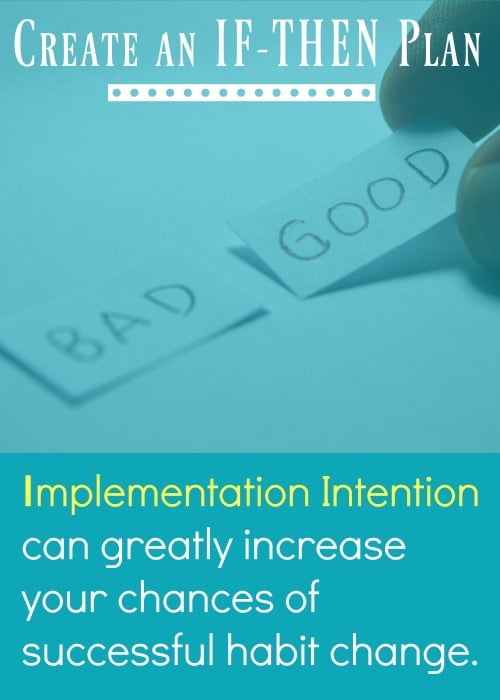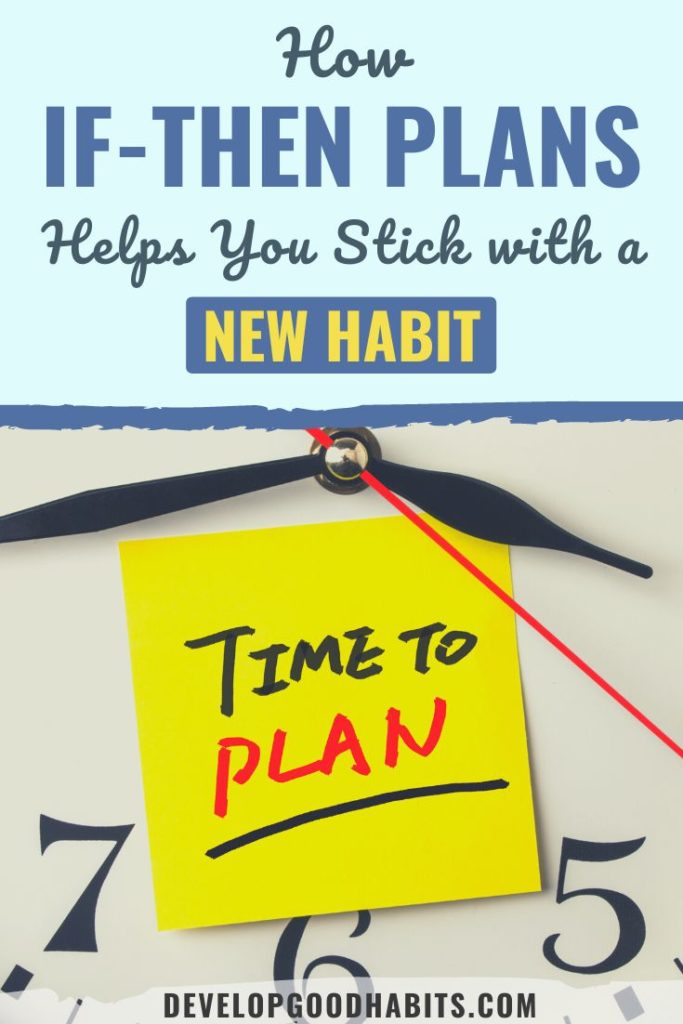There could be associate hyperlinks in this web page, because of this we get a small fee of anything else you purchase. As an Amazon Associate we earn from qualifying purchases. Please do your individual analysis prior to making any on-line acquire.
When it involves a dependancy exchange, all of us get started with the most efficient of intentions.
We promise to make a exchange, decide to it each day and consider a easiest long run the place we’re now not doing a unhealthy dependancy.
Then what generally occurs?
Failure.
The query is: Why do other folks fail after they get started with the most efficient of intentions.
Are they much less disciplined? Is the exchange much less essential to them? Do they lack motivation?
Are they consciously failing their dependancy exchange or are their unconscious decisions merely getting the easier of them?
While everybody has their very own excuse for failing, there’s one that sticks out:
Not having “if-then plans” in position.
In this text, we’ll speak about the advantages of the if-then plan and find out how to use it the following time you’re looking to make a main dependancy exchange.
Why People Fail to Change Their Habits
Recently we mentioned the variations between streak conduct and coffee conduct.
Streak conduct are the ones duties you whole each unmarried day (like flossing), whilst occasional conduct are performed best on particular days (like operating or lifting weights).
Even regardless that there’s a distinction between those two dependancy varieties, they each require one a very powerful aspect—making plans.
Countless research has shown that one of the simplest ways to finish a purpose is to have a strategic plan. Moreover, this plan must come with particular responses for a way you’ll deal with temptation and stumbling blocks.
While having need and motivation are essential for making a exchange, they’re no longer sufficient with regards to dealing with temptation.
Think of it this fashion…
Right now, we’re coming near the New Year. Lots of other folks have a authentic need to switch their lives, so that they make resolutions. Yet, 92% of them will fail to satisfy their solution (consistent with Forbes Magazine). That is a lot of failure.
Why does this occur to many of us?
The resolution is modest—they don’t create an if-then plan.
What are If-Then Plans?
Implementation goal is the fondness time period for if-then making plans. This thought used to be created by means of psychologist Peter Gollwitzer within the mid 90’s.
In one experiment, Gollwitzer requested his scholars to mail in an project two days prior to Christmas.
One crew used to be merely given the project, whilst the opposite used to be requested to shape particular if-then statements: When would they mail it, the place they’d mail it, and the way they’d mail it.
The effects?
The first crew (no particular directions) had a 32% luck fee. And the second one crew (if-then directions) had a 72% luck fee. That’s greater than double the share—just by growing a plan.
The ramification of if-then making plans has a large have an effect on in your subsequent dependancy exchange.
Instead of making aims or motion plan, the most efficient technique is to spot your triggers and determine find out how to keep away from them.
EXAMPLE:
Let’s say you wish to have to forestall losing cash.
This will also be difficult to become a day-to-day regimen. In reality, that specialize in no longer spending cash is ceaselessly counterproductive. That’s since the act of making an attempt not to take into accounts one thing ceaselessly brings it to the entrance of your thoughts and make you need that merchandise much more.
In Willpower Instinct, Kelly McGonigal described a fascinating experiment the place contributors have been requested to consider anything else but even so a white undergo.
And as you most likely may just wager, the one factor that popped into their thoughts used to be a white undergo. This experiment (and others) display that ceaselessly once we’re looking to keep away from a sure dependancy; we finally end up fixating on it and succumbing to the temptation.
When it involves a nebulous dependancy exchange like “stop wasting money,” you’d be at an advantage figuring out the “wasting money triggers” and growing a collection of if-then plans for a way you’ll conquer them.
You may just do that in a few tactics:
You get the purpose.
The level in the back of an if-then plan is to completely perceive the way you ceaselessly fail and create a plan for what you’ll do when a particular situation comes up.
How to Create Your If-Then Plans
What’s the name of the game to creating an if-then plan?
Here are nine-steps for imposing this technique:
1. One dependancy at a time.



No subject what, best center of attention on converting one dependancy at a time—despite the fact that two aren’t comparable to each other. (For extra in this, learn the item concerning the results of ego depletion.)
2. Set a goal purpose.
A purpose must be a giant image thought of what you wish to have. It must be particular as conceivable. “I want more money” isn’t a excellent purpose, however “I want to save $20,000 by the end of 2014” is easiest.
To learn to create excellent purpose statements, take a look at the 21 examples offered within the video beneath:
3. Create mini-goals.
Each main purpose must have a collection of smaller milestones. These will stay you energized and curious about what must be performed.
Not best are those essential to your general luck, they’re going to can help you deal with the precise triggers that ceaselessly pop up as you’re employed in opposition to a main purpose.
4. Set a baseline.
It is difficult to succeed in a purpose with no need a excellent start line. For example, in the event you’re spending an excessive amount of cash, then you definitely must get started by means of monitoring your day-to-day expenditures. See the place the cash goes and “what” you’re generally purchasing.
5. Spitball concepts.
Sit down and analyze the dependancy you’re looking to exchange. When do you do it? What creates the impulse to do it? Are there sure individuals who “cause” you to do the unhealthy dependancy?
Getting as a lot knowledge as conceivable will can help you create excellent if-then statements.
6. Track your unhealthy dependancy.
Take a notepad with you for a few weeks. Whenever you take into accounts doing a unhealthy dependancy, write down the stimuli round you. Certain points of interest, sounds, smells or even other folks can act as triggers.
Eventually, you’ll be capable to arise with if-then statements like: “If I am with Bobby, then I will only bring $40 in cash and nothing else.”
Here’s are some assets you might have considered trying to take a look at:
7. Develop a alternative dependancy.
Nature abhors a vacuum. If you’re looking to do away with a unhealthy dependancy, one thing else must take its position. It has been confirmed that it’s a long way more straightforward to replace a damaging regimen as an alternative of looking to eliminate it fully.
As an instance, let’s say you decide that “wasting money habit,” is your option to scale back pressure and calm down. You may just replace it with an workout dependancy.
So you may create an if-then commentary like: “If I feel like buying something from Amazon, I will instead go for a 30-minute walk.”
8. Set a company get started date.
Don’t put issues off indefinitely or they’ll by no means occur. Set a get started date to your new dependancy. You can proceed to refine your procedure and your statements as you move alongside.
9. Use screw ups to refine the if-then plan.
Failure occurs. Don’t let it get you down. If you fail simply upload to the record extra concepts to your statements. What brought about the failure? Was it a particular dependancy cause you to start with ignored? What are you able to do subsequent time?
You most certainly gained’t be easiest for your first try to exchange a dependancy exchange. In reality, it’s absolute best if you are expecting to slide up alongside the way in which. The individuals who be successful long-term notice that one unmarried mistake isn’t the tip of the sector.
They attempt to decrease the wear, struggle off the “what the hell effect” and climb again at the horse.
Final Thoughts on If-Then Plans
The secret to creating a lasting exchange is to create a collection of if-then statements to your conduct.
Create a record of the way you’ll reply to express situations and use those each time you’re tempted to observe via on a damaging impulse. You’ll to find it’s simple to stay with your commitments in case you have a transparent set of directions for each unmarried scenario.
If you are ready to in point of fact get started existence making plans, listed here are some assets to take a look at:
Finally, if you wish to have lend a hand with development conduct, then take a look at this nine-step blueprint that walks you via all the procedure of making lifelong conduct.)





